Backgrounder
Top 10 of the Most Evil Power Women in China’s History
They might have lived centuries ago, but are still the talk of the day in Chinese books, television shows and online media. They were often beautiful on the outside but cruel on the inside. They were rebels of their time, and would bewitch men with their charms to get what they wanted- some of them changed China’s history because of it. A top ten list of the most evil and powerful women in China’s history.
Published
10 years agoon
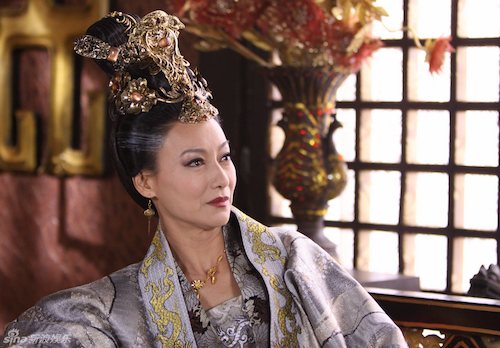
WHAT’S ON WEIBO ARCHIVE | PREMIUM CONTENT ARTICLE
China has a long history of notoriously strongheaded or ruthless women. This is a list compiled by What’s on Weibo of 10 women in China’s history who are often referred to as “evil” in (online) media.
They might have lived centuries ago, but are still the talk of the day in Chinese books, television shows and online media. They were often beautiful on the outside but cruel on the inside. They were rebels of their time, and would bewitch men with their charms to win more power – some of them changed China’s history because of it. From ten to one: a top 10 of evil power women in China’s history, carefully selected and compiled by What’s on Weibo based on different online Chinese charts and books about ‘evil’ women of China.
(Updated April/2018: Check out our recent video on this topic here).
SECRET ROMANCE & LAVISH SPENDING
10. Lu Xiaoman (陆小曼)
Lu Xiaoman was one of the most famous women in China’s roaring twenties. In her own time, she was considered scandalous: she had an extramarital affair, was then divorced, and led a lavish lifestyle.
Lu was born in an upperclass Shanghai family in 1903 and became known as a beautiful, well-educated and talented woman. She spoke fluent English and was a gifted writer and painter. She became married to the erudite Wang Geng. Within the first years of their marriage, Lu fell in love with one of Wang’s friends named Xu Zhimo, who was one of China’s most famous poets at the time. Zhimo had been married before, but was already divorced in what has been described as China’s “first modern divorce” (Lee 2007, 389).
Lu and the poet soon got tangled up in a complicated love-affair, while Lu was still married to Wang. Eventually, she got divorced herself and remarried to Xu in 1926. Xu soon found out that he could not afford Lu’s lifestyle. She lavishly spend their money on luxury goods, delicacies and extravagant nights out. She rented an expensive apartment and hired 14 servants. Lu’s luxurious lifestyle eventually got Xu in serious financial trouble.
During a fight over their expenses, the two got into a fight and Xu left their home for a trip, during which he died in a plane crash. Because Xu left during an argument, and because he took an old plane since he could not afford a modern one due to Lu’s spending, some argue that it was Lu Xiaoman who actually “killed” her husband (Sina 2014; Hong Lee&Stefanowska 2003, 389-391).
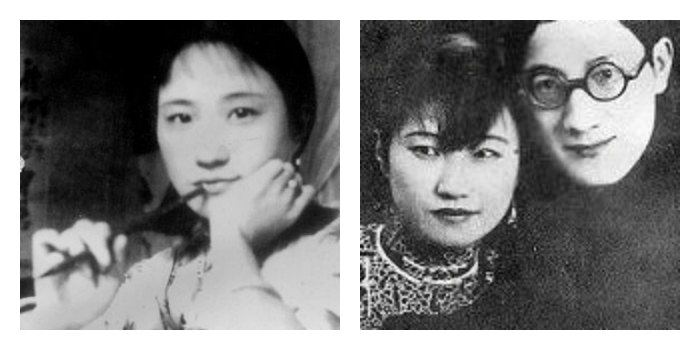 Lu Xiaoman, on the right pictured together with Xu Zhimo.
Lu Xiaoman, on the right pictured together with Xu Zhimo.
FROM SUPERSTAR TO SUPERTRAITOR
9. Li Xianglan (李香兰)
Li Xianglan was an actress and singer who was loved by the Chinese people for her talent and beauty, but also hated by them for her nationality. She was a Japanese woman who pretended to be Chinese for many years. Yamagachi Yoshiko (her Japanese name) was born in 1920 Manchuria to Japanese parents. As the Sino-Japanese War was on the way, she jumped to superstar status. Being fluent in Mandarin, the Chinese audience did not know she was Japanese.
During these years, she played in seventeen different films, of which some were produced by Japanese studios to create pro-Japanese sentiment in China. When she was later arrested for treason, she had to expose her true nationality in order to avoid punishment.
She initially fled to the US and changed her name to Shirley Yamaguchi, but later settled down in Japan and took on the name Otaka Yoshiko, although she also remained known as Ri Koran (the Japanese pronunciation of her Chinese name).
Throughout her life, Li Xianglan had five different identities. When she passed away in the summer of 2014, many Chinese people still remembered her as a woman who lied about her identity and betrayed China. To know more about Li Xianglan, read ‘Caught Between China & Japan: Superstar Li Xianglan‘.
INCEST & MURDER
8. Wen Jiang (文姜)
Her charm and beauty was praised in the oldest collection of Chinese poetry, the Classic of Poetry (诗经): Wen Jiang. She lived during the 6th century BC as princess of the State of Qi, and became the wife of Duke Huan of Lu (present-day Shandong) with whom she had a son.
Wen Jiang was a politically powerful woman with a dark secret, as she was involved in an ongoing incestuous relationship with her own brother, Duke Xiang. When the affair was exposed, Duxe Xiang threw a big feast for his brother-in-law and got him drunk in the hopes of calming matters down.
The opposite happened, as things got out of hand and Duke Huang was killed on the same night – allegedly by the son of Xiang at his order. Although Wen Jiang initially was supposed to bring her dead husband’s body back to Lu, she ended up staying at the border of Qi and Lu, where her son build her a residence. She stayed there for the rest of her life (Cook 2007, 81).
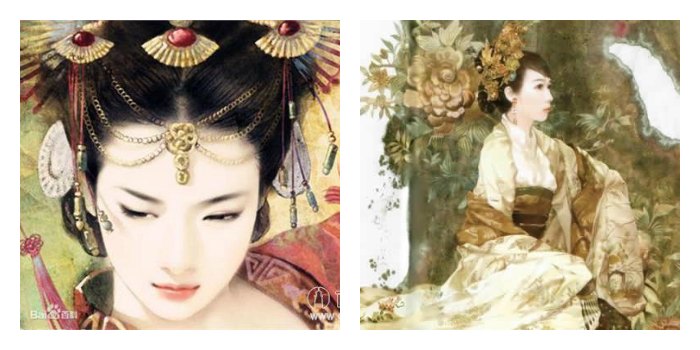 Wen Jiang in contemporary imagery.
Wen Jiang in contemporary imagery.
ADULTERY & INFANTICIDE
7. Zhao Feiyan (趙飛燕)
Zhao Feiyan (c. 32-1 BC) was a beautiful woman of humble origin who was called ‘flying swallow’ (feiyan) because of her ability to dance elegantly like a bird. The ruling emperor of the Han Dynasty, Cheng, became enticed with her. He turned Feiyan one of his mistresses together with her sister Hede.
Feiyan soon became powerful. Emperor Cheng became so attached to her that he got rid of his empress in favor of Feiyan, who now became empress in spite of her low societal background. Although she had taken the place of the first wife, she had one problem: she could not bear a son. She went to extreme measures to try to get pregnant. She started sleeping around with palace slaves in the hopes of getting pregnant.
When Cheng’s other concubines got pregnant, Feiyan forced them into abortions and killed any living children. As a result, the Emperor never had a heir. When Emperor Cheng passed away, Feiyan was arrested and sent to his tomb. This is where she commited suicide (Zhao 2000, 89).
 The role of Zhao Feiyan played by actress Tong Liya in the 2008 Chinese film The Queens (母仪天下).
The role of Zhao Feiyan played by actress Tong Liya in the 2008 Chinese film The Queens (母仪天下).
THE REAL MADAME BUTTERFLY
6. Shi Peipu (时佩璞): ‘M. Butterfly’
Although Shi Peipu was not biologically a woman, ‘she’ needs to be on this list because of her incredibly crafty ways and the fact she has cross-dressed as a woman for over two decades.
Shi Peipu was a spy working for the Chinese secret service, and was involved in what has been called one of the “strangest cases in international espionage” (Wadler 2009). For twenty years Shi pretended to be a woman during a love relationship with French diplomat Bernard Bouriscot in order to gather intelligence information from him.
Shi Peipu originally was an opera singer and actor from Kunming, who moved to Beijing in the 1960s. The 26-year-old Shi met Bouriscot there at a Christmas party at the French embassy in 1964, where Shi came dressed as a man. Shi told Bouriscot that he was actually a female opera singer who had been forced by his father to present himself as a man because he desired a son so much. Bouriscot believed it, and their affair took off; a romance that also continued when Bouriscot was stationed abroad.
Shi got Bouriscot entangled in Chinese espionage practices and went to extreme measures to keep the Frenchman close, as ‘she’ even convinced Boursicot that she had become pregnant with his child. Shi adopted a boy and presented him as their alleged child. In 1982, Shi and Bouriscot moved to Paris where they were both arrested a year later. Boursicot attempted suicide when he discovered that Shi was actually a man. He was convicted of espionage and spent six years in prison.
Shi passed away in 2009. The Broadway play ‘M. Butterfly’ by David Hwang was based on this story. It was also turned into a film. About the affair, Boursicot later said: “When I believed it, it was a beautiful story” (KPBS 1993; Leung 2003, 119). Shi’s adopted child, Shi Dudu, lives in Paris and has a family with three sons.
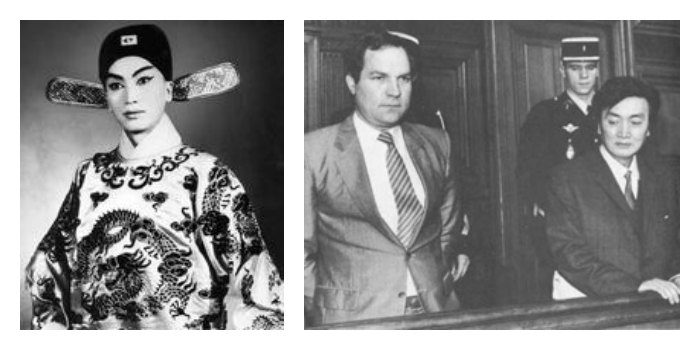 Shi Peipu the opera singer on the left, on the right: Bouriscot and Shi Peipu at court.
Shi Peipu the opera singer on the left, on the right: Bouriscot and Shi Peipu at court.
ANYTHING FOR POWER
5. Wu Zetian (武则天): Empress Wu
Wu Zetian (625-705) was an empress during the Tang Dynasty, and become famous for being the first and only female in Chinese history to rule the country as an emperor. She reigned China from 690, when she was 65 years old. Her status as emperor was not the only reason she became a famous historical figure: she was known for being extremely ruthless, going to utmost extremes in order to maintain power.
Wu Zetian was born into a rich family and was well-educated. She was only 13 when she was introduced to Emperor Taizhong. She became his concubine, although she also took a liking to his son Li Zhi. When the Emperor died, the 27-year old Wu then, unconventionally, became a concubine to Li Zhi. She had a baby daughter, but it was soon strangled to death. Wu accused the first wife of Li Zhi of murdering her baby, although it is commonly believed that it was Wu herself who killed it to frame Li Zhi’s first wife. She succeeded; the empress was deposed, and Wu rose in in rank. Her power grew even more when she had a son, who became the new emperor.
When the young man died of a stroke, Wu took over his rule. Some historians believe Wu in fact killed her own son to ascend the throne. She was declared emperor in 690. Wu was known for killing or locking up anybody that stood in her way. She had her own army of secret police to spy on her enemies and eliminate them. She eventually abdicated to let her third son rule. Not long after, she passed away at the age of 80 (Custer; WIWH 1996). The popular 2013 Chinese costume drama Women of the Tang Dynasty is based on the era of Wu Zetian the generations that followed.
 Wu Zetian played by Hui Yinghong in the TV series Women of the Tang Dynasty (唐宫燕).
Wu Zetian played by Hui Yinghong in the TV series Women of the Tang Dynasty (唐宫燕).
KILLING WITH CAKE
4. Empress Wei (韦皇后)
Empress Wei lived around the same as Wu Zetian. You might say Wu Zetian was a role model to Wei, as she tried to emulate her evil ways in order to gain power and influence. She was the wife of Emperor Zhongzong, Wu Zetian’s son, who was sent into exile when his brother was put on the throne. Wei joined her husband in exile. After 705, the emperor reascended the throne. At this time, Wei and the emperor had suffered many hardships while away from
After 705, the emperor reascended the throne. At this time, Wei and the emperor had suffered many hardships while away from court. Now that Wu Zetian had died, the spiteful Wei was determined to get a hold onto power. She began to interfere in state affairs. In order to get what she wanted, she manipulated and mobilized the clique of spies and supporters Wu Zetian had gathered while in power. In this way, Wei got to control the entire court. Her husband had become nothing but a puppet. She soon set out to remove and kill all of her enemies; she framed them with ingenious plots, got them exiled or executed. When her husband saw through her plans, she murdered him with poisonous steamed cakes – his favorite food.
In order to get what she wanted, she manipulated and mobilized the clique of spies and supporters Wu Zetian had gathered while in power. In this way, Wei got to control the entire court. Her husband had become nothing but a puppet. She soon set out to remove and kill all of her enemies; she framed them with ingenious plots, got them exiled or executed. When her husband saw through her plans, she murdered him with poisonous steamed cakes – his favorite food. Eventually her plans failed as her former sister-in-law jumped to power. Wei was beheaded in 710 (Peterson 2000, 202-206).
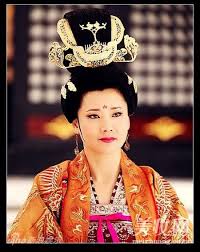 Empress Wei played by He Saifei in the 2013 television series Women of the Tang Dynasty (唐宫燕).
Empress Wei played by He Saifei in the 2013 television series Women of the Tang Dynasty (唐宫燕).
RUTHLESS & LAVISH
3. Empress Dowager Cixi (慈禧太后)
Empress Dowager Cixi (1835-1908) is one of China’s most famous empresses, known for her ruthlessness and resilience. She was born into a distinguished family of Manchu lineage and arrived at the Forbidden City as a concubine to Emperor Xianfeng in 1851.
She soon became his favorite, especially after she had given birth to a son. Xianfeng often discussed political matters with Cixi. She became well informed on state affairs and gradually grew more powerful. When Xianfeng died, Cixi did everything she could to gain political power. She ordered the suicide of the emperor’s regents and had her own son Tongzhi crowned as emperor.
She governed the state during his reign and during that of her nephew Guangxu. When he was put on the throne, she ordered him to reclusion in a palace within the Forbidden City, isolating him from the world and leaving him to see nobody but his wife and servants, who were then either put to death or banished. She effectively ruled the Chinese government for 47 years. Cixi was known for squandering money on luxurious banquets and expensive jewelry. At her banquets, she would request to be served 150 different dishes. She drank from a jade cup and ate with golden chopsticks. She was known for putting her own interests ahead of the nation until the end of her rule. At the end of her life, she still held grudges against her nephew Guangxu. She killed him through arsenic poisoning. She died one day later (Hilton 2013; SACU 2001; Spence 1990, 217-218).
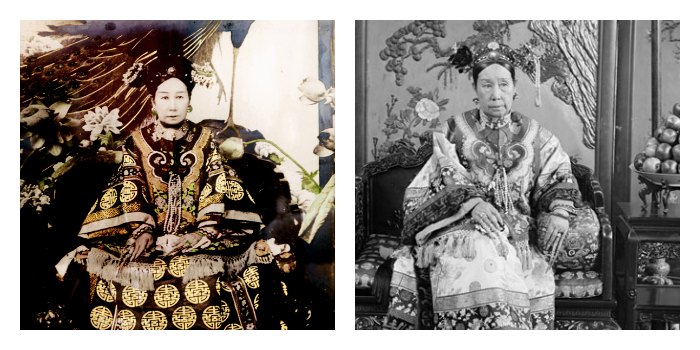 The empress in pictures. Right photograph is part of a photo series of the Empress Dowager, 1903-1904. To learn more about these pictures, see this info page about an exhibition themed around them.
The empress in pictures. Right photograph is part of a photo series of the Empress Dowager, 1903-1904. To learn more about these pictures, see this info page about an exhibition themed around them.
MURDER, MANIPULATION & TORTURE
2. Empress Lü Zhi (吕后)
Empress Lü (241–180 BC) was the first woman to become Empress of China. She was the wife of Emperor Liu Bang (Gaozu), founder of the Han Dynasty. Lü was very intelligent and her role was crucial in centralizing her husband’s rule. She became infamous for her cruelty and persistence in gaining ultimate power.
Empress Lü had several aristocratic and influential families killed so that the Emperor (and she herself) would maintain authority. After he died, she turned against his concubines. One of them was Qizi, who was very much loved by the Emperor. Qizi had born the Emperor a son, Ru Yi, who was the new heir of the household; something the Empress was displeased with. She had the young boy poisoned to death, and later turned against his mother. She mutilated Qizi by chopping off her hands and feet, scooping out her eyes, making her deaf and dumb with toxins, and abandoning her in a pigsty.
Up to her dying day, Empress Lü was known to make others suffer so she could have all the power to herself (Yao et al 2010, 64; Peterson 2000, 45-51).
 The role of Empress Lü played by Wang Ji in 2011 costume drama The Han Triump (大风歌).
The role of Empress Lü played by Wang Ji in 2011 costume drama The Han Triump (大风歌).
A VERY EVIL, VERY EVIL WOMAN
1. Jiang Qing (江青) or Madame Mao
Jiang Qing (1914-1991) is often pinpointed as one of the most evil women from China’s history because of her role during the Cultural Revolution. Deng Xiaoping once called her a “very evil, very evil woman” (很坏很坏的女人). Jiang played an important role during the Mao years as she was married to Mao Zedong and influenced his policies, especially those on art and culture.
She met Mao when she went to Yan’an in 1937. She was an actress in the left-wing theatre, and had been married and divorced twice before. She soon started to live together with Mao. Although Jiang initially kept her distance in political matters, she gradually became more influential and involved during the 1950s. She strengthened Mao’s position (and her own) by making sure that all influential people in the government and work units were loyal to Mao and herself. She removed those who allegedly were not. She soon gathered a group of supporters around her, and focused on the destruction of her enemies.
In 1968, she had the children of her enemy Zhou Enlai tortured and killed. As Mao’s health declined, she grew in influence. Together with Yao Wenyuan, Wang Hongwen and Zhang Chunqiao she formed the Gang of Four. After Mao’s death, the Gang was soon overthrown and accused of “persecuting to death” an estimated 34,800 people during the Cultural Revolution and having “framed and persecuted” 729,511 others during the years they were in power. Jiang maintained that Mao had supported her and that she had only obeyed his will (Spence 1990, 680-681; Kristof 1991). Although Jiang was initially condemned to death, she was later sentenced to life in prison. She committed suicide at the age of 77 in 1991 (Lee 2007, 259-263).
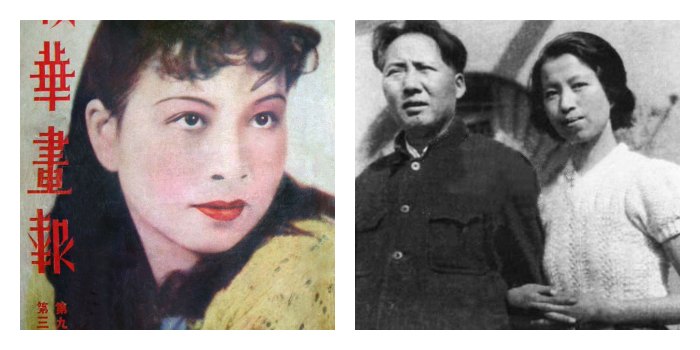 Jiang qing in her young years on the cover of a movie magazine and pictured with Mao Zedong (right).
Jiang qing in her young years on the cover of a movie magazine and pictured with Mao Zedong (right).
References
Cook, Constance. 2007. “Wen Jiang, Wife of Duke Huan of Lu,” In Lily Xiao Hong Lee and A.D. Stefanowska (eds), Biographical Dictionary of Chinese Women, Antiquity Through Sui, 1600 B.C.E. – 618 C.E., 81. New York: ME Sharpe.
Custer, Charles. “Wu Zetian, China’s Only Female Emperor.” Chinese Culture http://chineseculture.about.com/od/historyofchina/fl/Wu-Zetian.htm (Accessed Dec 8, 2014).
Hilton, Isabel. 2013. “Empress Dowager Cixi: The Concubine Who Launched Modern China by Jung Chang – review.” The Guardian, 25 Oct http://www.theguardian.com/books/2013/oct/25/empress-dowager-cixi-jung-chang-review (Accessed November 19, 2014).
KPBS. 1993. “Theatre Preview M. Butterfly at North Coast Reportory Theatre.” KPBS On Air Magazine, August www.patteproductions.com/Previews/Archive/prev93/oa930800.htm (Accessed December 5, 2014).
Kristof, Nikolas. 1991. “Suicide of Jiang Qing, Mao’s Widow, Is Reported.” New York Times, 5 June http://www.nytimes.com/1991/06/05/obituaries/suicide-of-jiang-qing-mao-s-widow-is-reported.html (Accessed December 5, 2014).
Lee, Lily Xiao Hong and A.D. Stefanowska (eds). 2003. Biographic Dictionary of Chinese Women. The Twentieth Century: 1912-2000. New York: M.E. Sharpe.
Lee, Lily Xiao Hong. 2007. “Lu Xiaoman.” In Lily Xiao Hong Lee and A.D. Stefanowska (eds), Biographical Dictionary of Chinese Women, Antiquity Through Sui, 1600 B.C.E. – 618 C.E.,389-392. New York: ME Sharpe.
–. 2003. “Jiang Qing.” In Lily Xiao Hong Lee and A.D. Stefanowska (eds). 2003. Biographic Dictionary of Chinese Women. The Twentieth Century: 1912-2000, 259-263. New York: M.E. Sharpe.
Leung Li, Siu. 2003. Cross-Dressing in Chinese Opera. Hong Kong: Hong Kong University Press.
Peterson, Barbara Bennett (ed). 2000. Notable Women of China: Shang Dynasty to the Early Twentieth Century. New York: M.E. Sharpe.
SACU. 2001. “The Life of Empress Cixi.” Society for Anglo-Chinese Understanding http://www.sacu.org/cixi.html (Accessed December 5, 2014).
Sina 2014. “花钱太多:徐志摩养不活陆小曼.” Sina News, 3 July http://history.sina.com.cn/bk/mgs/2014-07-03/163294573.shtml (Accessed December 5, 2014).
Spence, Jonathan. 1990. The Search for Modern China. Norton&Company: New York.
Wadler, Joyce. 2009. “Shi Pei Pu, Singer, Spy and ‘M. Butterfly,’ Dies at 70.” New York Times, 9 June http://www.nytimes.com/2009/07/02/world/asia/02shi.html (Accessed Dec 9, 2014).
WIWH (Women in World History). 1996. “Empress Wu Zetian.” Women in World History www.womeninworldhistory.com/heroine6.html (Accessed December 4, 2014).
Yao Dan et al. 2010. Chinese Literature. Cambridge: Cambridge University Press.
Zhao Xiaoming. 2000. “Zhao Feiyan.” In Barbara Bennett Peterson (ed), Notable Women of China: Shang Dynasty to the Early Twentieth Century, 87-89. New York: M.E. Sharpe.
Follow What’s on Weibo on Twitter.
Appreciate this article and want to donate a cup of green tea? Yay! You can do so here.
©2014 Whatsonweibo. All rights reserved. Do not reproduce without permission – you can contact us at info@whatsonweibo.com.
Manya Koetse is the founder and editor-in-chief of whatsonweibo.com. She is a writer, public speaker, and researcher (Sinologist, MPhil) on social trends, digital developments, and new media in an ever-changing China, with a focus on Chinese society, pop culture, and gender issues. She shares her love for hotpot on hotpotambassador.com. Contact at manya@whatsonweibo.com, or follow on Twitter.

Backgrounder
“Oppenheimer” in China: Highlighting the Story of Qian Xuesen
Qian Xuesen is a renowned Chinese scientist whose life shares remarkable parallels with Oppenheimer’s.
Published
10 months agoon
September 16, 2023By
Zilan Qian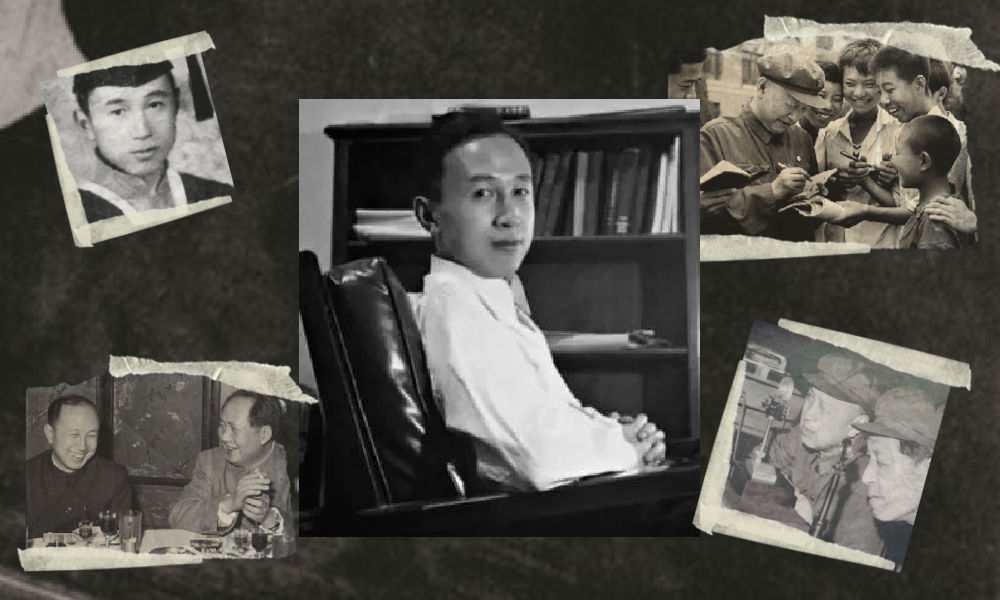
They shared the same campus, lived in the same era, and both played pivotal roles in shaping modern history while navigating the intricate interplay between science and politics. With the release of the “Oppenheimer” movie in China, the renowned Chinese scientist Qian Xuesen is being compared to the American J. Robert Oppenheimer.
In late August, the highly anticipated U.S. movie Oppenheimer finally premiered in China, shedding light on the life of the famous American theoretical physicist J. Robert Oppenheimer (1904-1967).
Besides igniting discussions about the life of this prominent scientist, the film has also reignited domestic media and public interest in Chinese scientists connected to Oppenheimer and nuclear physics.
There is one Chinese scientist whose life shares remarkable parallels with Oppenheimer’s. This is aerospace engineer and cyberneticist Qian Xuesen (钱学森, 1911-2009). Like Oppenheimer, he pursued his postgraduate studies overseas, taught at Caltech, and played a pivotal role during World War II for the US.
Qian Xuesen is so widely recognized in China that whenever I introduce myself there, I often clarify my last name by saying, “it’s the same Qian as Qian Xuesen’s,” to ensure that people get my name.
Some Chinese blogs recently compared the academic paths and scholarly contributions of the two scientists, while others highlighted the similarities in their political challenges, including the revocation of their security clearances.
The era of McCarthyism in the United States cast a shadow over Qian’s career, and, similar to Oppenheimer, he was branded as a “communist suspect.” Eventually, these political pressures forced him to return to China.
Although Qian’s return to China made his later life different from Oppenheimer’s, both scientists lived their lives navigating the complex dynamics between science and politics. Here, we provide a brief overview of the life and accomplishments of Qian Xuesen.
Departing: Going to America
Qian Xuesen (钱学森, also written as Hsue-Shen Tsien), often referred to as the “father of China’s missile and space program,” was born in Shanghai in 1911,1 a pivotal year marked by a historic revolution that brought an end to the imperial dynasty and gave rise to the Republic of China.
Much like Oppenheimer, who pursued further studies at Cambridge after completing his undergraduate education, Qian embarked on a journey to the United States following his bachelor’s studies at National Chiao Tung University (now Shanghai Jiao Tong University). He spent a year at Tsinghua University in preparation for his departure.
The year was 1935, during the eighth year of the Chinese Civil War and the fourth year of Japan’s invasion of China, setting the backdrop for his academic pursuits in a turbulent era.
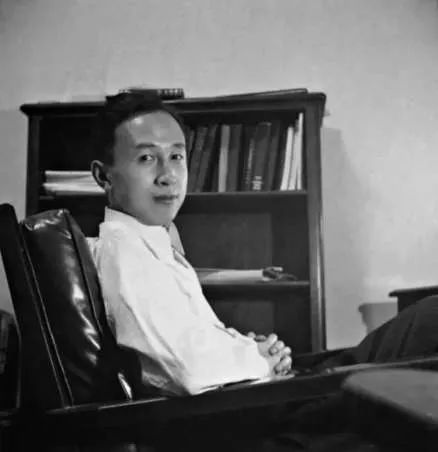
Qian in his office at Caltech (image source).
One year after arriving in the U.S., Qian earned his master’s degree in aeronautical engineering from the Massachusetts Institute of Technology (MIT). Three years later, in 1939, the 27-year-old Qian Xuesen completed his PhD at the California Institute of Technology (Caltech), the very institution where Oppenheimer had been welcomed in 1927. In 1943, Qian solidified his position in academia as an associate professor at Caltech. While at Caltech, Qian helped found NASA’s Jet Propulsion Laboratory.
When World War II began, while Oppenheimer was overseeing the Manhattan Project’s efforts to assist the U.S. in developing the atomic bomb, Qian actively supported the U.S. government. He served on the U.S. government’s Scientific Advisory Board and attained the rank of lieutenant colonel.

The first meeting of the US Department of the Air Force Scientific Advisory Board in 1946. The predecessor, the Scientific Advisory Group, was founded in 1944 to evaluate the aeronautical programs and facilities of the Axis powers of World War II. Qian can be seen standing in the back, the second on the left (image source).
After the war, Qian went to teach at MIT and returned to Caltech as a full-time professor in 1949. During that same year, Mao Zedong proclaimed the establishment of the People’s Republic of China (PRC). Just one year later, the newly-formed nation became involved in the Korean War, and China fought a bloody battle against the United States.
Red Scare: Being Labeled as a Communist
Robert Oppenheimer and Qian Xuesen both had an interest in Communism even prior to World War II, attending communist gatherings and showing sympathy towards the Communist cause.
Qian and Oppenheimer may have briefly met each other through their shared involvement in communist activities. During his time at Caltech, Qian secretly attended meetings with Frank Oppenheimer, the brother of J. Robert Oppenheimer (Monk 2013).
However, it was only after the war that their political leanings became a focal point for the FBI.
Just as the FBI accused Oppenheimer of being an agent of the Soviet Union, they quickly labeled Qian as a subversive communist, largely due to his Chinese heritage. While the government did not succeed in proving that Qian had communist ties with China during that period, they did ultimately succeed in portraying Qian as a communist affiliated with China a decade later.
During the transition from the 1940s to the 1950s, the Cold War was underway, and the anti-communist witch-hunts associated with the McCarthy era started to intensify (BBC 2020).
In 1950, the Korean War erupted, with the People’s Republic of China (PRC) joining North Korea in the conflict against South Korea, which received support from the United States. It was during this tumultuous period that the FBI officially accused Qian of communist sympathies in 1950, leading to the revocation of his security clearance despite objections from Qian’s colleagues. Four years later, in 1954, Robert Oppenheimer went through a similar process.
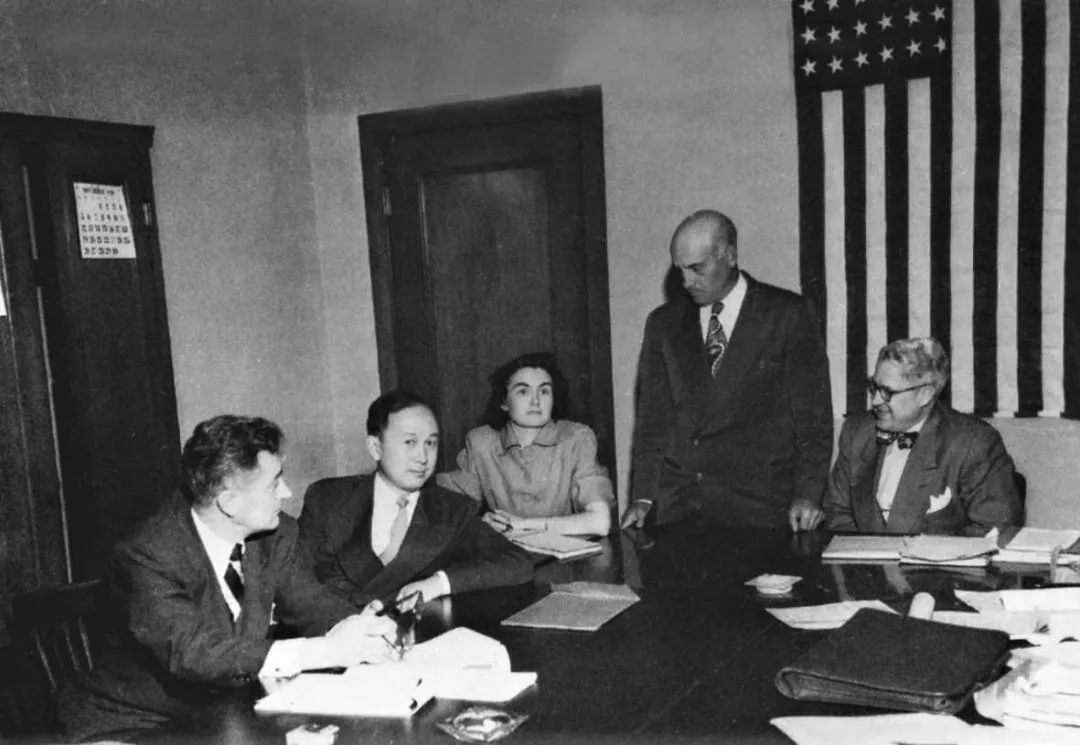
The 1950’s security hearing of Qian (second left). (Image source).
After losing his security clearance, Qian began to pack up, saying he wanted to visit his aging parents back home. Federal agents seized his luggage, which they claimed contained classified materials, and arrested him on suspicion of subversive activity. Although Qian denied any Communist leanings and rejected the accusation, he was detained by the government in California and spent the next five years under house arrest.
Five years later, in 1955, two years after the end of the Korean War, Qian was sent home to China as part of an apparent exchange for 11 American airmen who had been captured during the war. He told waiting reporters he “would never step foot in America again,” and he kept his promise (BBC 2020).
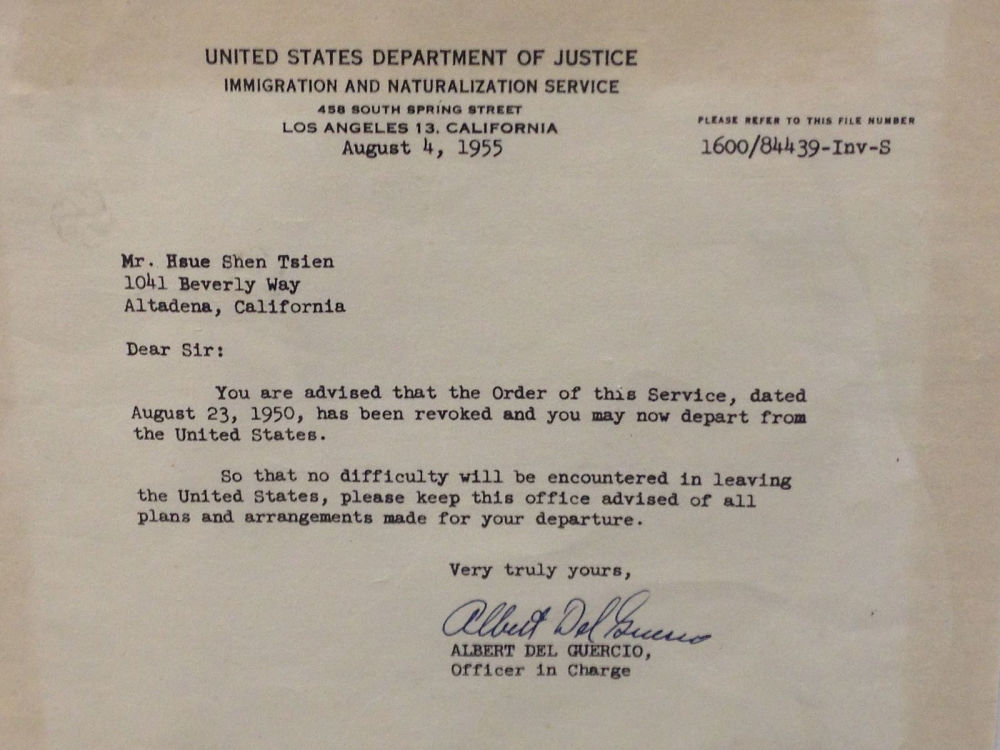
A letter from the US Immigration and Naturalization Service to Qian Xuesen, dated August 4, 1955, in which he was notified he was allowed to leave the US. The original copy is owned by Qian Xuesen Library of Shanghai Jiao Tong University, where the photo was taken. (Caption and image via wiki).
Dan Kimball, who was the Secretary of the US Navy at the time, expressed his regret about Qian’s departure, reportedly stating, “I’d rather shoot him dead than let him leave America. Wherever he goes, he equals five divisions.” He also stated: “It was the stupidest thing this country ever did. He was no more a communist than I was, and we forced him to go” (Perrett & Bradley, 2008).
Kimball may have foreseen the unfolding events accurately. After his return to China, Qian did indeed assume a pivotal role in enhancing China’s military capabilities, possibly surpassing the potency of five divisions. The missile programme that Qian helped develop in China resulted in weapons which were then fired back on America, including during the 1991 Gulf War (BBC 2020).
Returning: Becoming a National Hero
The China that Qian Xuesen had left behind was an entirely different China than the one he returned to. China, although having relatively few experts in the field, was embracing new possibilities and technologies related to rocketry and space exploration.
Within less than a month of his arrival, Qian was welcomed by the then Vice Prime Minister Chen Yi, and just four months later, he had the honor of meeting Chairman Mao himself.
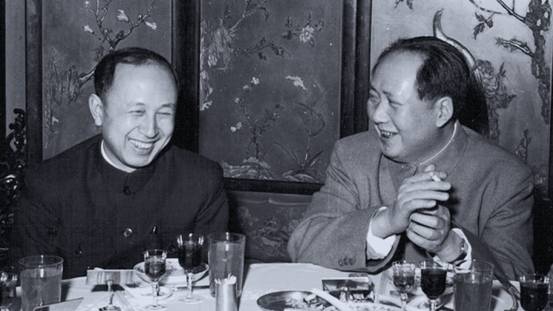
Qian and Mao (image source).
In China, Qian began a remarkably successful career in rocket science, with great support from the state. He not only assumed leadership but also earned the distinguished title of the “father” of the Chinese missile program, instrumental in equipping China with Dongfeng ballistic missiles, Silkworm anti-ship missiles, and Long March space rockets.
Additionally, his efforts laid the foundation for China’s contemporary surveillance system.
By now, Qian has become somewhat of a folk hero. His tale of returning to China despite being thwarted by the U.S. government has become like a legendary narrative in China: driven by unwavering patriotism, he willingly abandoned his overseas success, surmounted formidable challenges, and dedicated himself to his motherland.
Throughout his lifetime, Qian received numerous state medals in recognition of his work, establishing him as a nationally celebrated intellectual. From 1989 to 2001, the state-launched public movement “Learn from Qian Xuesen” was promoted throughout the country, and by 2001, when Qian turned 90, the national praise for him was on a similar level as that for Deng Xiaoping in the decade prior (Wang 2011).
Qian Xuesen remains a celebrated figure. On September 3rd of this year, a new “Qian Xuesen School” was established in Wenzhou, Zhejiang Province, becoming the sixth high school bearing the scientist’s name since the founding of the first one only a year ago.
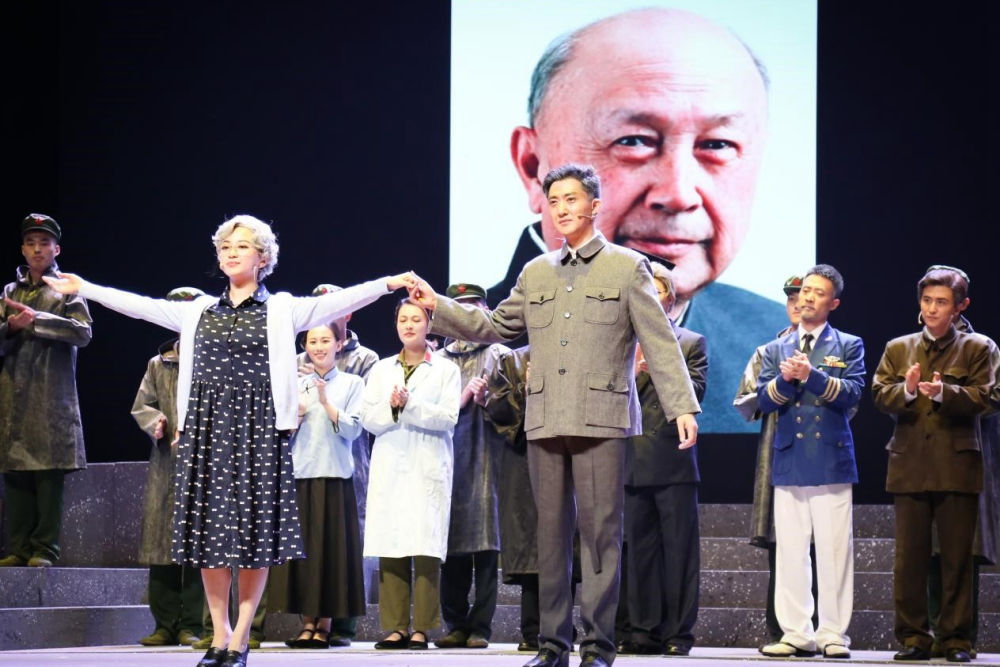
In 2017, the play “Qian Xuesen” was performed at Qian’s alma mater, Shanghai Jiaotong University. (Image source.)
Qian Xuesen’s legacy extends well beyond educational institutions. His name frequently appears in the media, including online articles, books, and other publications. There is the Qian Xuesen Library and a museum in Shanghai, containing over 70,000 artefacts related to him. Qian’s life story has also been the inspiration for a theater production and a 2012 movie titled Hsue-Shen Tsien (钱学森).2
Unanswered Questions
As is often the case when people are turned into heroes, some part of the stories are left behind while others are highlighted. This holds true for both Robert Oppenheimer and Qian Xuesen.
The Communist Party of China hailed Qian as a folk hero, aligning with their vision of a strong, patriotic nation. Many Chinese narratives avoid the debate over whether Qian’s return was linked to problems and accusations in the U.S., rather than genuine loyalty to his homeland.
In contrast, some international media have depicted Qian as a “political opportunist” who returned to China due to disillusionment with the U.S., also highlighting his criticism of “revisionist” colleagues during the Cultural Revolution and his denunciation of the 1989 student demonstrations.
Unlike the image of a resolute loyalist favored by the Chinese public, Qian’s political ideology was, in fact, not consistently aligned, and there were instances where he may have prioritized opportunity over loyalty at different stages of his life.
Qian also did not necessarily aspire to be a “flawless hero.” Upon returning to China, he declined all offers to have his biography written for him and refrained from sharing personal information with the media. Consequently, very little is known about his personal life, leaving many questions about the motivations driving him, and his true political inclinations.

The marriage photo of Qian and Jiang. (Image source).
We do know that Qian’s wife, Jiang Ying (蒋英), had a remarkable background. She was of Chinese-Japanese mixed race and was the daughter of a prominent military strategist associated with Chiang Kai-shek. Jiang Ying was also an accomplished opera singer and later became a professor of music and opera at the Central Conservatory of Music in Beijing.
Just as with Qian, there remain numerous unanswered questions surrounding Oppenheimer, including the extent of his communist sympathies and whether these sympathies indirectly assisted the Soviet Union during the Cold War.
Perhaps both scientists never imagined they would face these questions when they first decided to study physics. After all, they were scientists, not the heroes that some narratives portray them to be.
Also read:
■ Farewell to a Self-Taught Master: Remembering China’s Colorful, Bold, and Iconic Artist Huang Yongyu
■ “His Name Was Mao Anying”: Renewed Remembrance of Mao Zedong’s Son on Chinese Social Media
By Zilan Qian
Follow @whatsonweibo
1 Some sources claim that Qian was born in Hangzhou, while others say he was born in Shanghai with ancestral roots in Hangzhou.
2The Chinese character 钱 is typically romanized as “Qian” in Pinyin. However, “Tsien” is a romanization in Wu Chinese, which corresponds to the dialect spoken in the region where Qian Xuesen and his family have ancestral roots.
This article has been edited for clarity by Manya Koetse
References (other sources hyperlinked in text)
BBC. 2020. “Qian Xuesen: The man the US deported – who then helped China into space.” BBC.com, 27 October https://www.bbc.com/news/stories-54695598 [9.16.23].
Monk, Ray. 2013. Robert Oppenheimer: A Life inside the Center, First American Edition. New York: Doubleday.
Perrett, Bradley, and James R. Asker. 2008. “Person of the Year: Qian Xuesen.” Aviation Week and Space Technology 168 (1): 57-61.
Wang, Ning. 2011. “The Making of an Intellectual Hero: Chinese Narratives of Qian Xuesen.” The China Quarterly, 206, 352-371. doi:10.1017/S0305741011000300
Get the story behind the hashtag. Subscribe to What’s on Weibo here to receive our newsletter and get access to our latest articles:
Spotted a mistake or want to add something? Please let us know in comments below or email us. First-time commenters, please be patient – we will have to manually approve your comment before it appears.
©2023 Whatsonweibo. All rights reserved. Do not reproduce our content without permission – you can contact us at info@whatsonweibo.com.
Backgrounder
Farewell to a Self-Taught Master: Remembering China’s Colorful, Bold, and Iconic Artist Huang Yongyu
Renowned Chinese artist and the creator of the ‘Blue Rabbit’ zodiac stamp Huang Yongyu has passed away at the age of 98. “I’m not afraid to die. If I’m dead, you may tickle me and see if I smile.”
Published
1 year agoon
June 15, 2023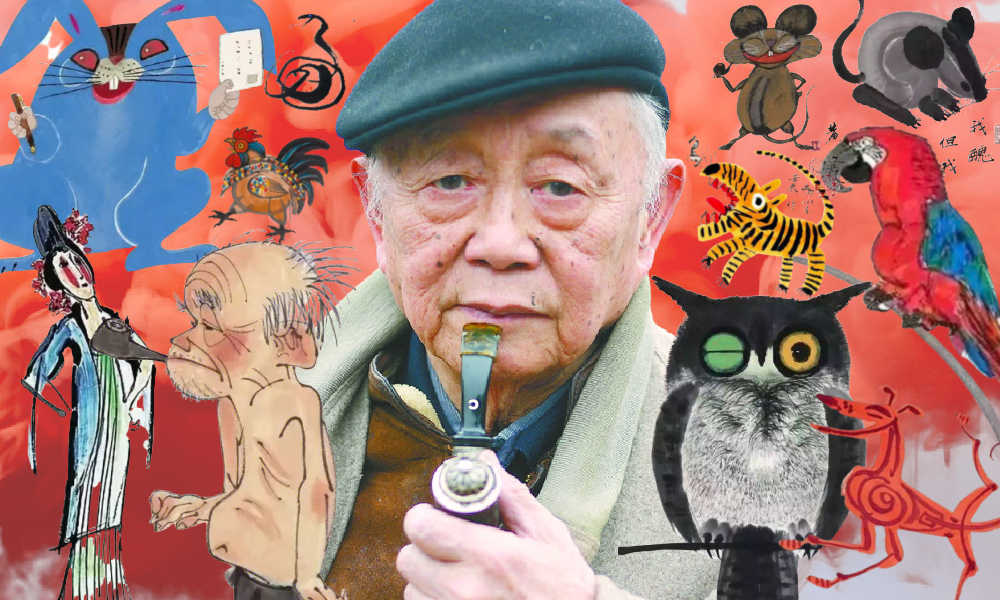
The famous Chinese painter, satirical poet, and cartoonist Huang Yongyu has passed away. Born in 1924, Huang endured war and hardship, yet never lost his zest for life. When his creativity was hindered and his work was suppressed during politically tumultuous times, he remained resilient and increased “the fun of living” by making his world more colorful.
He was a youthful optimist at old age, and will now be remembered as an immortal legend. The renowned Chinese painter and stamp designer Huang Yongyu (黄永玉) passed away on June 13 at the age of 98. His departure garnered significant attention on Chinese social media platforms this week.
On Weibo, the hashtag “Huang Yongyu Passed Away” (#黄永玉逝世#) received over 160 million views by Wednesday evening.
Huang was a member of the China National Academy of Painting (中国国家画院) as well as a Professor at the Central Academy of Fine Arts (中央美术学院).
Huang Yongyu is widely recognized in China for his notable contribution to stamp design, particularly for his iconic creation of the monkey stamp in 1980. Although he designed a second monkey stamp in 2016, the 1980 stamp holds significant historical importance as it marked the commencement of China Post’s annual tradition of releasing zodiac stamps, which have since become highly regarded and collectible items.
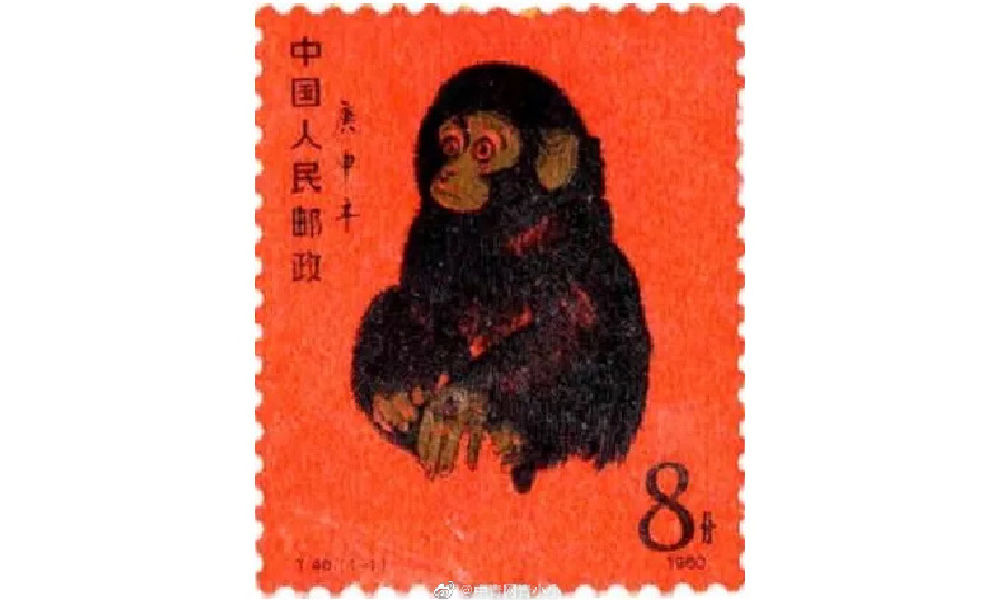
Huang’s famous money stamp that was issued by China Post in 1980.
The monkey stamp designed by Huang Yongyu has become a cherished collector’s item, even outside of China. On online marketplaces like eBay, individual stamps from this series are being sold for approximately $2000 these days.
Huang Yongyu’s latest most famous stamp was this year’s China Post zodiac stamp. The stamp, a blue rabbit with red eyes, caused some online commotion as many people thought it looked “horrific.”
Some thought the red-eyed blue rabbit looked like a rat. Others thought it looked “evil” or “monster-like.” There were also those who wondered if the blue rabbit looked so wild because it just caught Covid.
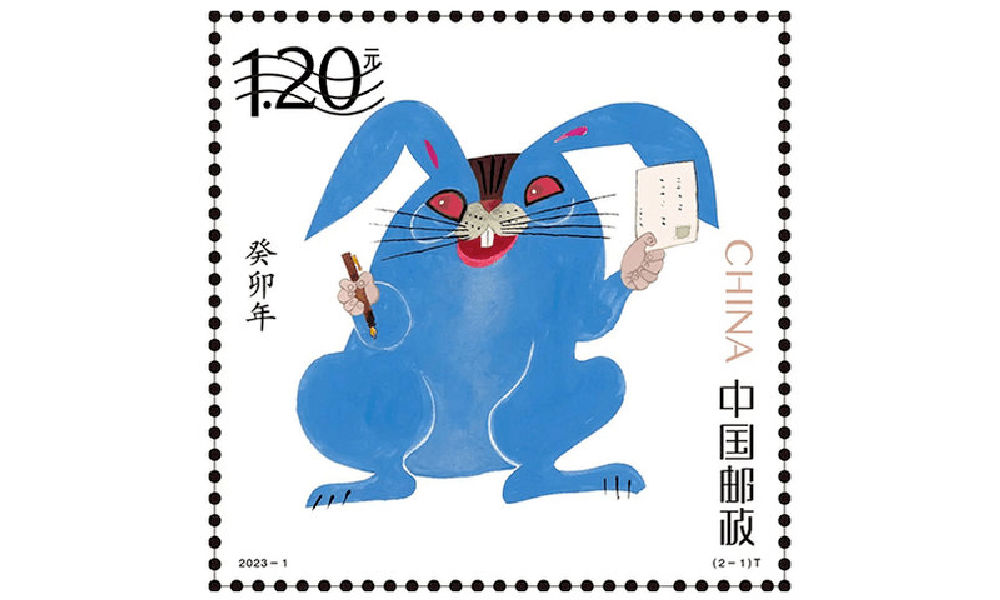
Huang’s (in)famous blue rabbit stamp.
Nevertheless, many people lined up at post offices for the stamps and they immediately sold out.
In light of the controversy, Huang Yongyu spoke about the stamps in a livestream in January of 2023. The 98-year-old artist claimed he had simply drawn the rabbit to spread joy and celebrate the new year, stating, “Painting a rabbit stamp is a happy thing. Everyone could draw my rabbit. It’s not like I’m the only one who can draw this.”
Huang’s response also went viral, with one Weibo hashtag dedicated to the topic receiving over 12 million views (#蓝兔邮票设计者直播回应争议#) at the time. Those defending Huang emphasized how it was precisely his playful, light, and unique approach to art that has made Huang’s work so famous.
A Self-Made Artist
“I’m ugly, but my mum likes me”
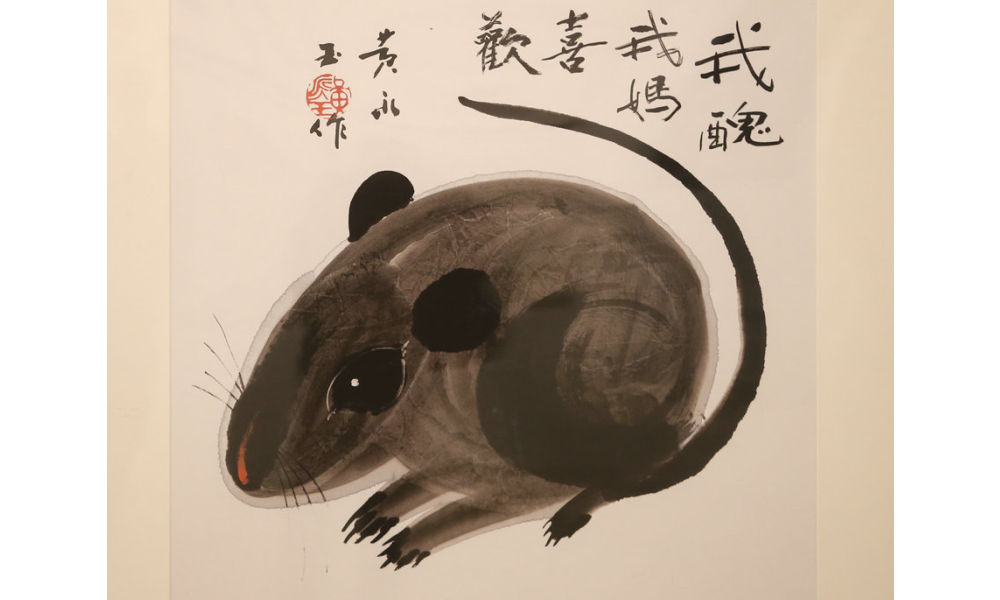
‘Ugly Mouse’ by Huang Yongyu [Image via China Daily].
Huang Yongyu was born on August 9, 1924, in Hunan’s Chengde as a native of the Tujia ethnic group.
He was born into an extraordinary family. His grandfather, Huang Jingming (黄镜铭), worked for Xiong Xiling (熊希齡), who would become the Premier of the Republic of China. His first cousin and lifelong friend was the famous Chinese novelist Shen Congwen (沈从文). Huang’s father studied music and art and was good at drawing and playing the accordion. His mother graduated from the Second Provincial Normal School and was the first woman in her county to cut her hair short and wear a short skirt (CCTV).
Born in times of unrest and poverty, Huang never went to college and was sent away to live with relatives at the age of 13. His father would die shortly after, depriving him of a final goodbye. Huang started working in various places and regions, from porcelain workshops in Dehua to artisans’ spaces in Quanzhou. At the age of 16, Huang was already earning a living as a painter and woodcutter, showcasing his talents and setting the foundation for his future artistic pursuits.
When he was 22, Huang married his first girlfriend Zhang Meixi (张梅溪), a general’s daughter, with whom he shared a love for animals. He confessed his love for her when they both found themselves in a bomb shelter after an air-raid alarm.
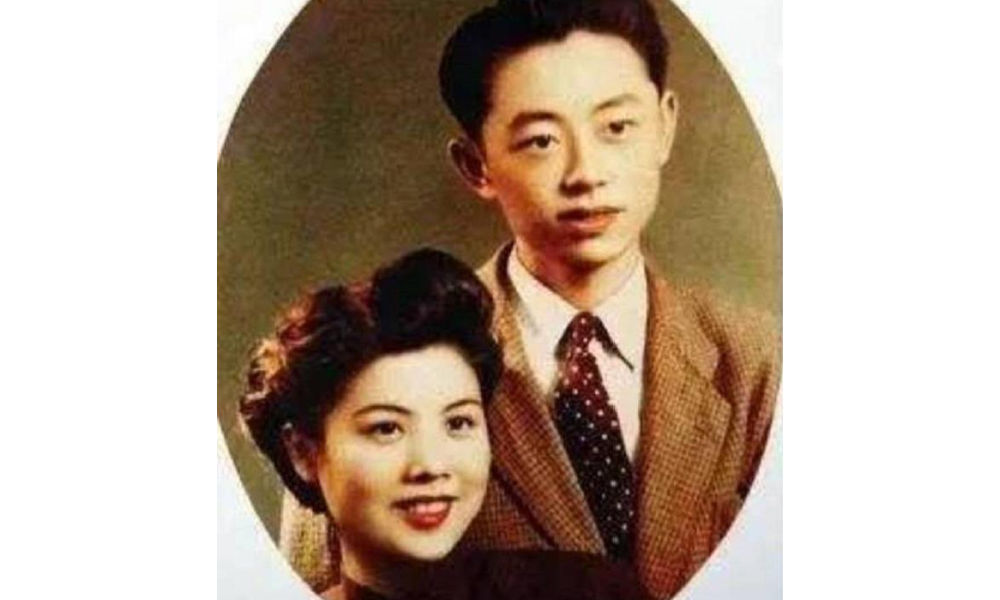
Huang and Zhang Meixi [163.com]
In his twenties, Huang Yongyu emerged as a sought-after artist in Hong Kong, where he had relocated in 1948 to evade persecution for his left-wing activities. Despite achieving success there, he heeded Shen Congwen’s advice in 1953 and moved to Beijing. Accompanied by his wife and their 7-month-old child, Huang took on a teaching position at the esteemed Central Academy of Fine Arts (中央美术学院).
The couple raised all kinds of animals at their Beijing home, from dogs and owls to turkeys and sika deers, and even monkeys and bears (Baike).
Throughout Huang’s career, animals played a significant role, not only reflecting his youthful spirit but also serving as vehicles for conveying satirical messages.
One recurring motif in his artwork was the incorporation of mice. In one of his famous works, a grey mouse is accompanied by the phrase ‘I’m ugly, but my mum likes me’ (‘我丑,但我妈喜欢’), reinforcing the notion that regardless of our outward appearance or circumstances, we remain beloved children in the eyes of our mothers.
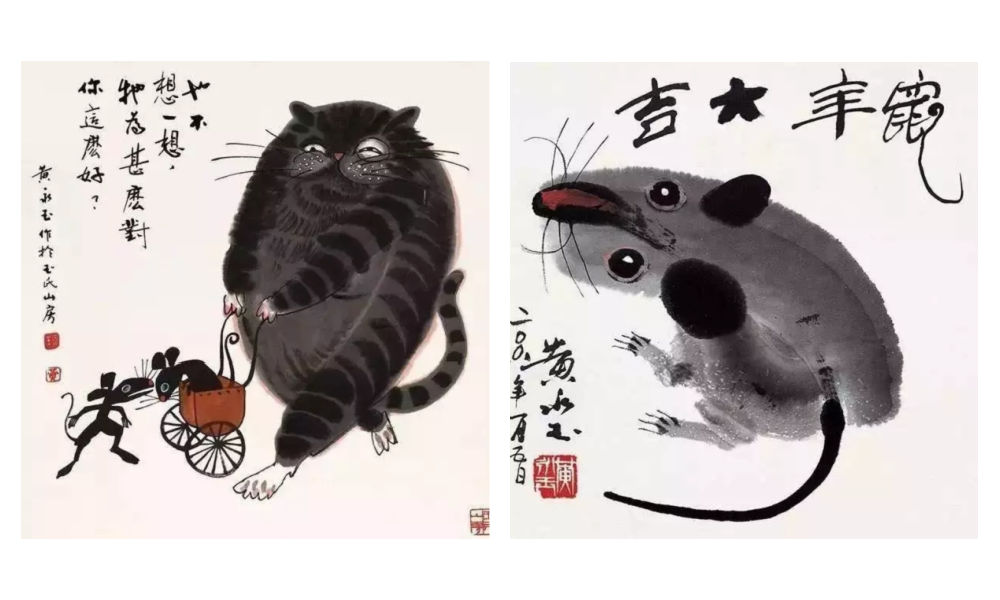
As a teacher, Huang liked to keep his lessons open-minded and he, who refused to join the Party himself, stressed the importance of art over politics. He would hold “no shirt parties” in which his all-male studio students would paint in an atmosphere of openness and camaraderie during hot summer nights (Andrews 1994, 221; Hawks 2017, 99).
By 1962, creativity in the classroom was limited and there were far more restrictions to what could and could not be created, said, and taught.
Bright Colors in Dark Times
“Strengthen my resolve and increase the fun of living”
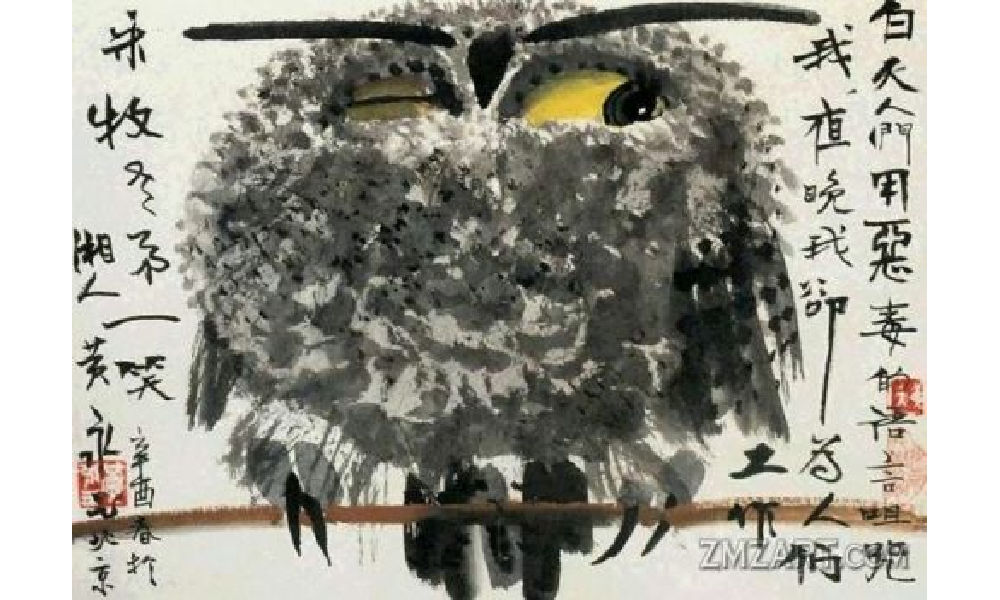
Huang Yongyu’s winking owl, 1973, via Wikiart.
In 1963, Huang was sent to the countryside as part of the “Four Cleanups” movement (四清运动, 1963-1966). Although Huang cooperated with the requirement to attend political meetings and do farm work, he distanced himself from attempts to reform his thinking. In his own time, and even during political meetings, he would continue to compose satirical and humorous pictures and captions centered around animals, which would later turn into his ‘A Can of Worms’ series (Hawks 2017, 99; see Morningsun.org).
Three years later, at the beginning of the Cultural Revolution, many Chinese major artists, including Huang, were detained in makeshift jails called ‘niupeng‘ (牛棚), cowsheds. Huang’s work was declared to be counter-revolutionary, and he was denounced and severely beaten. Despite the difficult circumstances, Huang’s humor and kindness would remind his fellow artist prisoners of the joy of daily living (2017, 95-96).
After his release, Huang and his family were relocated to a cramped room on the outskirts of Beijing. The authorities, thinking they could thwart his artistic pursuits, provided him with a shed that had only one window, which faced a neighbor’s wall. However, this limitation didn’t deter Huang. Instead, he ingeniously utilized vibrant pigments that shone brightly even in the dimly lit space.
During this time, he also decided to make himself an “extra window” by creating an oil painting titled “Eternal Window” (永远的窗户). Huang later explained that the flower blossoms in the paining were also intended to “strengthen my resolve and increase the fun of living” (Hawks 2017, 4; 100-101).
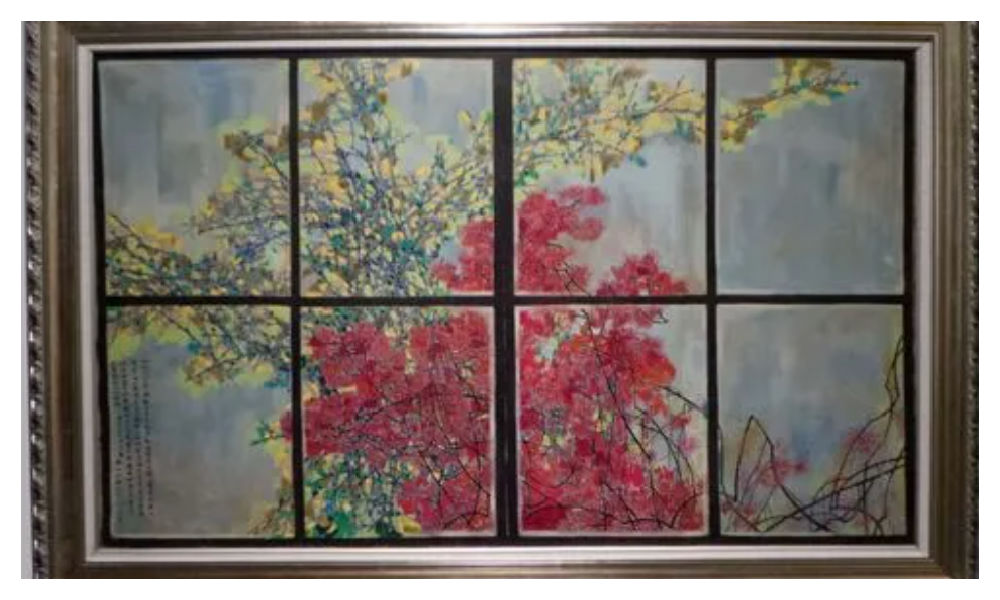
Huang Yongyu’s Eternal Window [Baidu].
In 1973, during the peak of the Cultural Revolution, Huang painted his famous winking owl. The calligraphy next to the owl reads: “During the day people curse me with vile words, but at night I work for them” (“白天人们用恶毒的语言诅咒我,夜晚我为他们工作”) (Matthysen 2021, 165).
The painting was seen as a display of animosity towards the regime, and Huang got in trouble for it. Later on in his career, however, Huang would continue to paint owls. In 1977, when the Cultural Revolution had ended, Huang Yongyu painted other owls to ridicules his former critics (2021, 174).
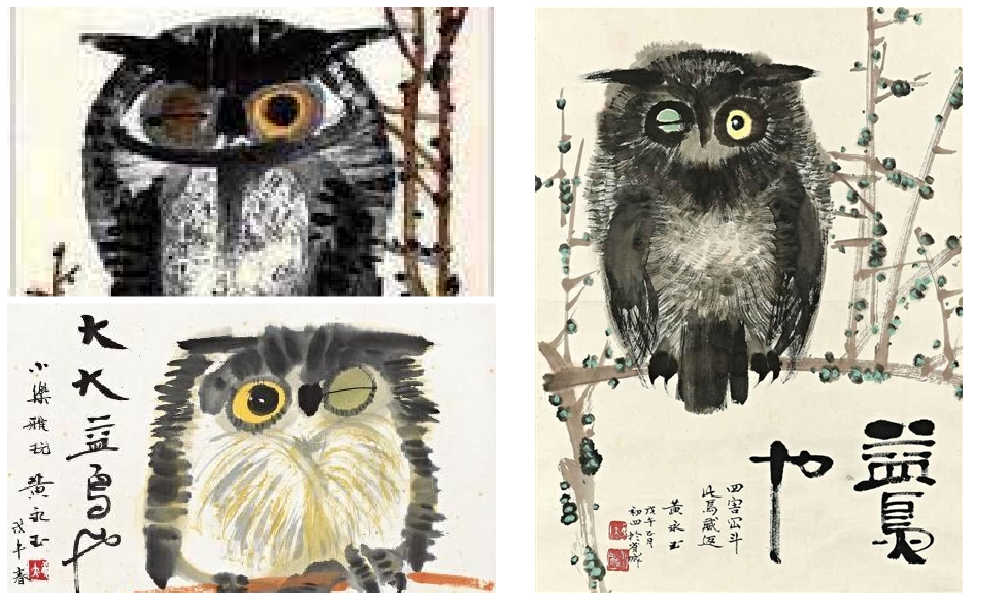
According to art scholar Shelly Drake Hawks, Huang Yongyu employed animals in his artwork to satirize the realities of life under socialism. This approach can be loosely compared to George Orwell’s famous novel Animal Farm.
However, Huang’s artistic style, vibrant personal life, and boundary-pushing work ethic also draw parallels to Picasso. Like Picasso, Huang embraced a colorful life, adopted an innovative approach to art, and challenged artistic norms.
An Optimist Despite All Hardships
“Quickly come praise me, while I’m still alive”
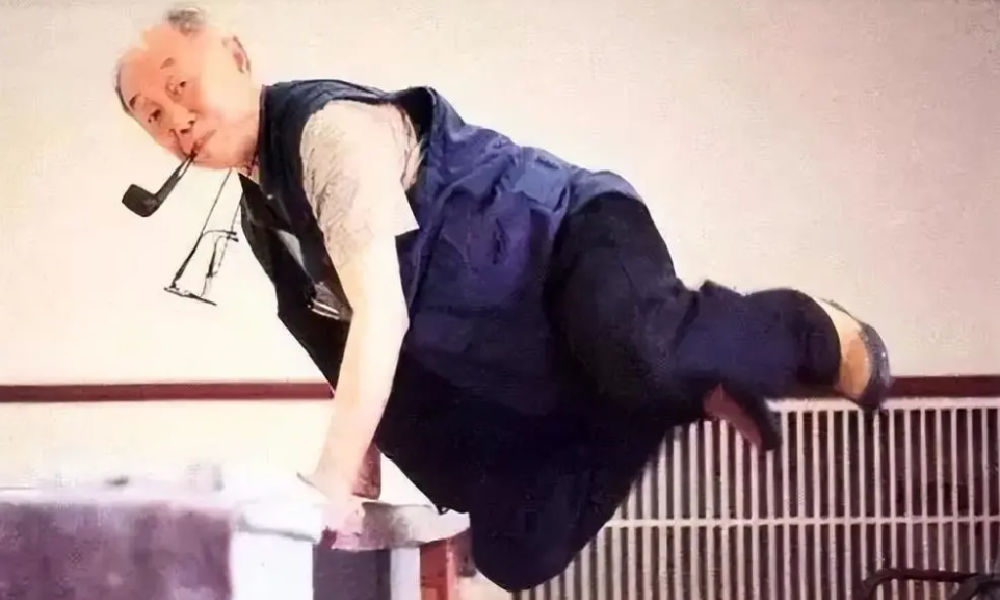
Huang Yongyu will be remembered in China with love and affection for numerous reasons. Whether it is his distinctive artwork, his mischievous smile and trademark pipe, his unwavering determination to follow his own path despite the authorities’ expectations, or his enduring love for his wife of over 75 years, there are countless aspects to appreciate and admire about Huang.
One things that is certainly admirable is how he was able to maintain a youthful and joyful attitude after suffering many hardships and losing so many friends.
“An intriguing soul. Too wonderful to describe,” one Weibo commenter wrote about Huang, sharing pictures of Huang Yongyu’s “Scenes of Pooping” (出恭图) work.
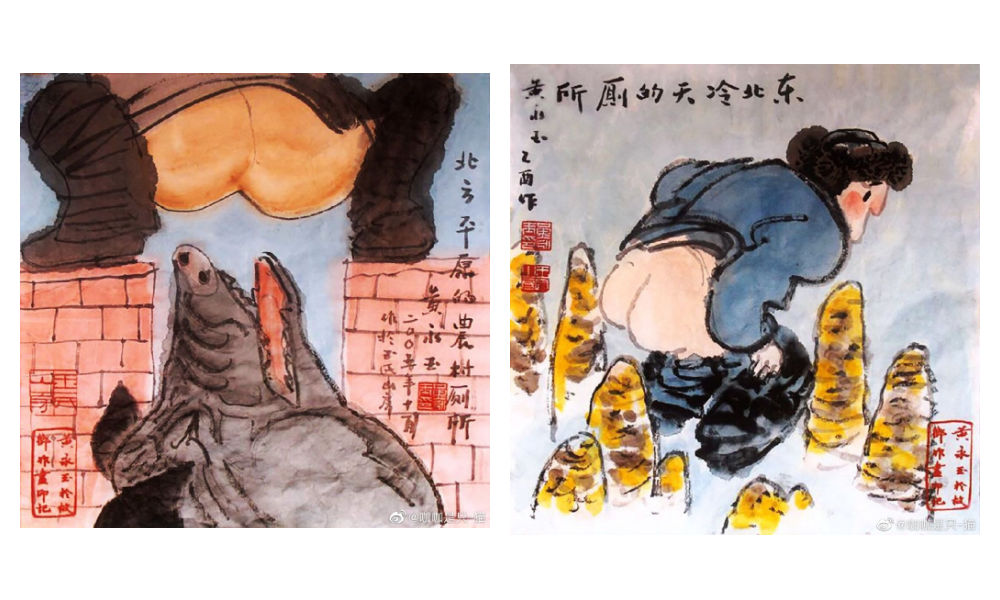
Old age did not hold him back. At the age of 70, his paintings sold for millions. When he was in his eighties, he was featured on the cover of Esquire (时尚先生) magazine.
At the age of 82, he stirred controversy in Hong Kong with his “Adam and Eve” sculpture featuring male and female genitalia, leading to complaints from some viewers. When confronted with the backlash, Huang answered, “I just wanted to have a taste of being sued, and see how the government would react” (Ora Ora).
I'm guessing the 98-year-old Huang loved the controversy. When confronted with backlash for his sculpture featuring male and female genitalia in 2007 Hong Kong, Huang answered, "I just wanted to have a taste of being sued, and see how the government would react." pic.twitter.com/kG0MVVM4SN
— Manya Koetse (@manyapan) June 15, 2023
In his nineties, he started driving a Ferrari. He owned mansions in his hometown in Hunan, in Beijing, in Hong Kong, and in Italy – all designed by himself (Chen 2019).
Huang kept working and creating until the end of his life. “It’s good to work diligently. Your work may be meaningful. Maybe it won’t be. Don’t insist on life being particularly meaningful. If it’s happy and interesting, then that’s great enough.”
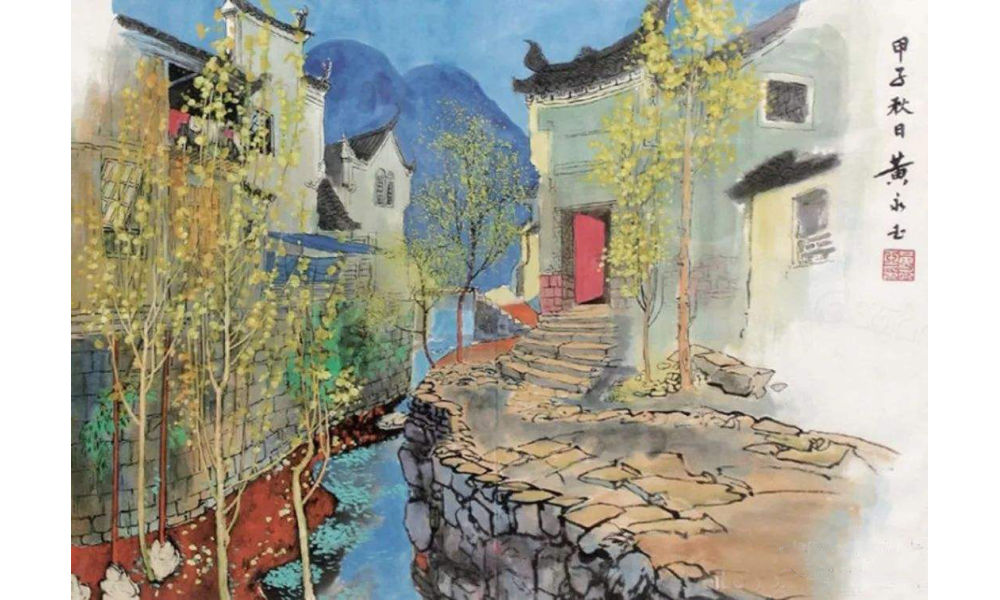
“Hometown Scenery” or rather “Hunan Scenery” (湘西风景) by Huang.
Huang did not dread the end of his life.
“My old friends have all died, I’m the only one left,” he said at the age of 95. He wrote his will early and decided he wanted a memorial service for himself before his final departure. “Quickly come praise me, while I’m still alive,” he said, envisioning himself reclining on a chair in the center of the room, “listening to how everyone applauds me” (CCTV, Sohu).
He stated: “I don’t fear death at all. I always joke that when I die, you should tickle me first and see if I’ll smile” (“对死我是一点也不畏惧,我开玩笑,我等死了之后先胳肢我一下,看我笑不笑”).

Huang with Yiwo (伊喔), the original model for the monkey stamp [Shanghai Observer].
Huang also was not sentimental about what should happen to his ashes. In a 2019 article in Guangming Daily, it was revealed that he suggested to his wife the idea of pouring his ashes into the toilet and flushing them away with the water.
However, his wife playfully retorted, saying, “No, that won’t do. Your life has been too challenging; you would clog the toilet.”
To this, Huang responded, “Then wrap my ashes into dumplings and let everyone [at the funeral] eat them, so you can tell them, ‘You’ve consumed Huang Yongyu’s ashes!'”
But she also opposed of that idea, saying that they would vomit and curse him forever.
Nevertheless, his wife expressed opposition to this idea, citing concerns that it would cause people to vomit and curse him indefinitely.
In response, Huang declared, “Then let’s forget about my ashes. If you miss me after I’m gone, just look up at the sky and the clouds.” Eventually, his wife would pass away before him, in 2020, at the age of 98, having spent 77 years together with Huang.
Huang will surely be missed. Not just by the loved ones he leaves behind, but also by millions of his fans and admirers in China and beyond.
“We will cherish your memory, Mr. Huang,” one Weibo blogger wrote. Others honor Huang by sharing some of his famous quotes, such as, “Sincerity is more important than skill, which is why birds will always sing better than humans” (“真挚比技巧重要,所以鸟总比人唱得好”).
Among thousands of other comments, another social media user bid farewell to Huang Yongyu: “Our fascinating Master has transcended. He is now a fascinating soul. We will fondly remember you.”
By Manya Koetse
Get the story behind the hashtag. Subscribe to What’s on Weibo here to receive our newsletter and get access to our latest articles:
References
Andrews, Julia Frances. 1994. Painters and Politics in the People’s Republic of China, 1949-1979. Berkley: University of California Press.
Baike. “Huang Yongyu 黄永玉.” Baidu Baike https://baike.baidu.com/item/%E9%BB%84%E6%B0%B8%E7%8E%89/1501951 [June 14, 2023].
CCTV. 2023. “Why Everyone Loves Huang Yongyu [为什么人人都爱黄永玉].” WeChat 央视网 June 14.
Chen Hongbiao 陈洪标. 2019. “Most Spicy Artist: Featured in a Magazine at 80, Flirting with Lin Qingxia at 91, Playing with Cars at 95, Wants Memorial Service While Still Alive [最骚画家:80岁上杂志,91岁撩林青霞,95岁玩车,活着想开追悼会].” Sohu/Guangming Daily March 16: https://www.sohu.com/a/301686701_819105 [June 15, 2023].
Hawks, Shelley Drake. 2017. The Art of Resistance Painting by Candlelight in Mao’s China. Seattle: University of Washington Press.
Matthysen, Mieke. 2021. Ignorance is Bliss: The Chinese Art of Not Knowing. Palgrave Macmillan.
Ora Ora. “HUANG YONGYU 黃永玉.” Ora Ora https://www.ora-ora.com/artists/103-huang-yongyu/ [June 15, 2023].
Spotted a mistake or want to add something? Please let us know in comments below or email us. First-time commenters, please be patient – we will have to manually approve your comment before it appears.
©2023 Whatsonweibo. All rights reserved. Do not reproduce our content without permission – you can contact us at info@whatsonweibo.com.
Subscribe

Weibo Watch: The Future is Here

“Bye Bye Biden”: Biden’s Many Nicknames in Chinese

Enjoying the ‘Sea’ in Beijing’s Ditan Park

A Triumph for “Comrade Trump”: Chinese Social Media Reactions to Trump Rally Shooting

Weibo Watch: Get Up, Stand Up

The Tragic Story of “Fat Cat”: How a Chinese Gamer’s Suicide Went Viral

“Old Bull Eating Young Grass”: 86-Year-Old Chinese Painter Fan Zeng Marries 36-Year-Old Xu Meng

A Brew of Controversy: Lu Xun and LELECHA’s ‘Smoky’ Oolong Tea

Singing Competition or Patriotic Fight? Hunan TV’s ‘Singer 2024’ Stirs Nationalistic Sentiments

Zara Dress Goes Viral in China for Resemblance to Haidilao Apron

Weibo Watch: The Battle for the Bottom Bed

About the “AI Chatbot Based on Xi Jinping” Story

China’s Intensified Social Media Propaganda: “Taiwan Must Return to Motherland”

Weibo Watch: Telling China’s Stories Wrong

Saying Goodbye to “Uncle Wang”: Wang Wenbin Becomes Chinese Ambassador to Cambodia
Get in touch
Would you like to become a contributor, or do you have any tips or suggestions? Get in touch here!
Popular Reads
-

 China Insight3 months ago
China Insight3 months agoThe Tragic Story of “Fat Cat”: How a Chinese Gamer’s Suicide Went Viral
-

 China Music4 months ago
China Music4 months agoThe Chinese Viral TikTok Song Explained (No, It’s Not About Samsung)
-

 China Digital10 months ago
China Digital10 months agoToo Sexy for Weibo? Online Discussions on the Concept of ‘Cābiān’
-

 China Arts & Entertainment12 months ago
China Arts & Entertainment12 months agoBehind 8 Billion Streams: Who is Dao Lang Cursing in the Chinese Hit Song ‘Luocha Kingdom’?

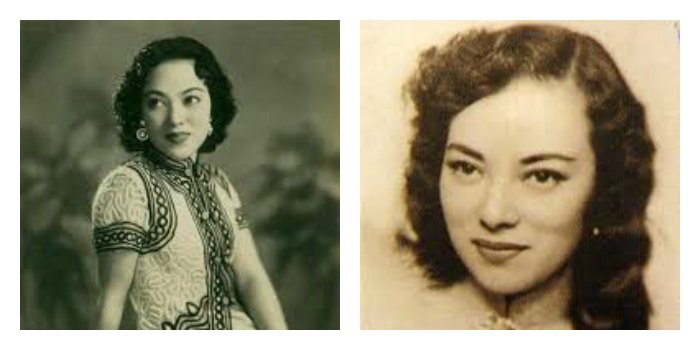





Xiaoxiao Li
December 9, 2014 at 11:57 pm
“In 1968, she had the children of her enemy Zhou Enlai tortured and killed.” Not true. Zhou Enlai s well known for having no child.
Manya Koetse
December 11, 2014 at 11:28 am
He did – they were adopted.
Ricky
December 10, 2014 at 5:50 am
That was a fascinating article. I have been pondering why no one seems to trust anyone in Chinese culture. It seems these chess matches have been going on for centuries.
Sania Bright
April 20, 2015 at 7:41 am
great list thanks for sharing
Yan
December 2, 2015 at 9:26 pm
I don’t think Wu Zetian is evil. As a female ruler in ancient China, she has been highly appreciated throughout history by people, particularly by women. We can’t ignore her contribution. We can probably say that other women were evil, because they did terrible things without any contribution to society. I disagree with that Lu Xiaoman is evil. You shouldn’t say that she “killed” her husband. That’s discrimination.
Big Duh
April 22, 2017 at 12:58 am
Well, we all know that there are many rumors out there and maybe they are true. But if she actually killed a child, it doesn’t matter how she contributed to society, she’s still evil. You can contribute to society and still be an evil son of a bitch bastard that ruin innocent people’s lives.
Maggie
June 2, 2017 at 1:54 pm
I agree, she isn’t very evil. My parents and my relatives all think Wu Zetian aren’t evil. Maybe this is from a Chinese perspective. A lot of western articles say she is evil. But the Chinese wrote songs about Wu Zetian and how great she is. She made Buddhism the national religion. She made equal rights for women, and she made less taxes for the peasants. She’s ruthless, but probably not evil.
Bernard R
February 3, 2016 at 12:41 pm
Informative and well-written, Ms Koetse. I’m thinking that Wei and especially Wu might’ve torn a page from the previous Nothern Wei Dynasty archives and the infamous Dowager Empress Hu, huuuu had poisoned her young son (and heir to the thrown) when he reached ruling age and replaced him with a different (2-yr-old) crown prince but was quickly overthrown by a general who was loyal to her late son and who promptly had her–along with the uncomprehending 2-yr-old Emperor–into the Yellow River to drown-
Oh, which reminds me, who was the badass 18th or 19th century Chinese woman pirate? Powerful and viscious; evil too, if you don’t like pirates.
anonymous
August 20, 2017 at 1:48 am
I just knew that Mao’s wife would end up at #1 on this list!
MNRC
May 4, 2018 at 12:56 pm
The title of this article is incredibly misogynistic and smacks of patriarchal condescension. Why were any of these women “evil”? Because they had the nerve to do what any smart male emperor would have done in her place? Political intrigue, ruthless assassinations, and societal manipulation was the name of the game in the imperial courts of dynastic China and you either lived to tell your story or died trying. Any of the “evil” actions of these women were committed a million times more by male emperors throughout Chinese history.
As a leader Wu Zetian was actually one of the best emperors China had ever seen. Chinese historians hate her because she was strong, unfeminine, and unapologetically power hungry; she was utterly ruthless–seizing and wielding power like a man when no woman had dared to do this so publicly in the past. Wu Zetian embodies feminist leadership and her actions were no worse than the male leaders that came before or after her. To condemn these powerful women as “evil” is to enforce sexist oppression on women who chose power over the life of a docile doormat there to be stepped on by men, husbands, sons, and an intensely patriarchal society.
“She reformed the educational and governmental selection process so that talented people were promoted, regardless of rank. She boosted agricultural production by rewarding good administrators, punishing those who taxed the peasants too heavily, re-allocating land fairly and improving public works. She strengthened defence and foreign relations, so that by 697 AD, military threats in the far northwest had been overcome and territorial limits extended deep into Central Asia. She also completed the conquest of the upper Korean peninsula. Notably, she made Buddhism the favoured state religion ahead of Daoism.
By the time she died 15 years later, Wu had created a powerful and prosperous regime and social stability. She was buried in the Qianling Tomb in Shaanxi province.” From http://yp.scmp.com/education/article/91619/wu-zetian-chinas-fierce-and-fearless-empress-and-feminist
From a feminist perspective Wu Zetian demonstrated that women can be equally as powerful and effective leaders as men.
Tervashonka
August 16, 2018 at 5:29 pm
If a female emperor acts in the same evil way as a male emperor, that means they are both evil. Saying that atrocities carried out by female emperors is misogyny just because male emperors have been guilty of same kind of actions just does not make any sense.
From a non feminist perspective Wu Zetian did indeed demonstrate that women can be equally as powerful and effective as men, but she also demonstrated that women can be just as ruthless and evil leaders as men. Therefore she indeed deserves a spot on this list.
Yas
October 28, 2020 at 9:05 pm
First two don’t really deserve to be on the list.